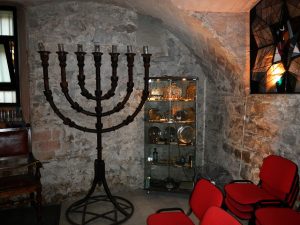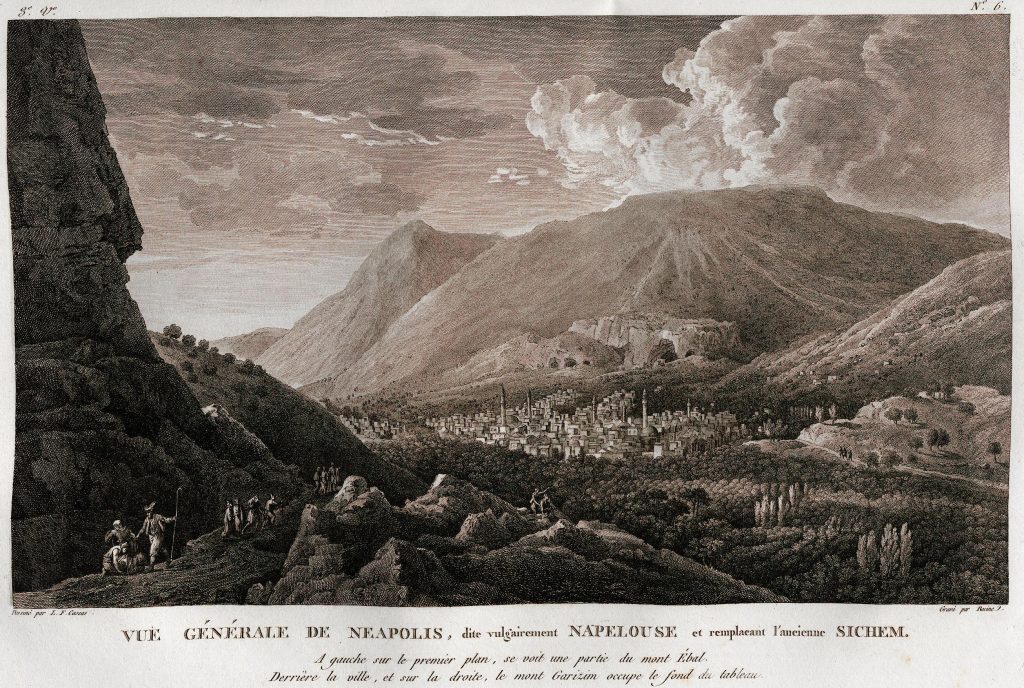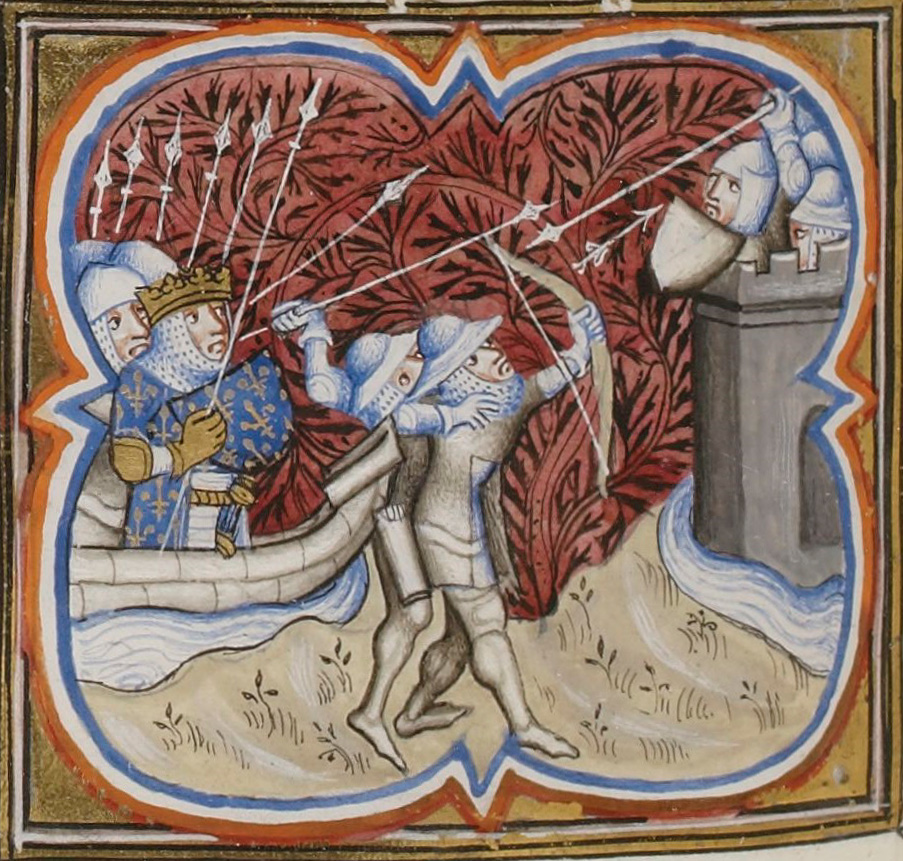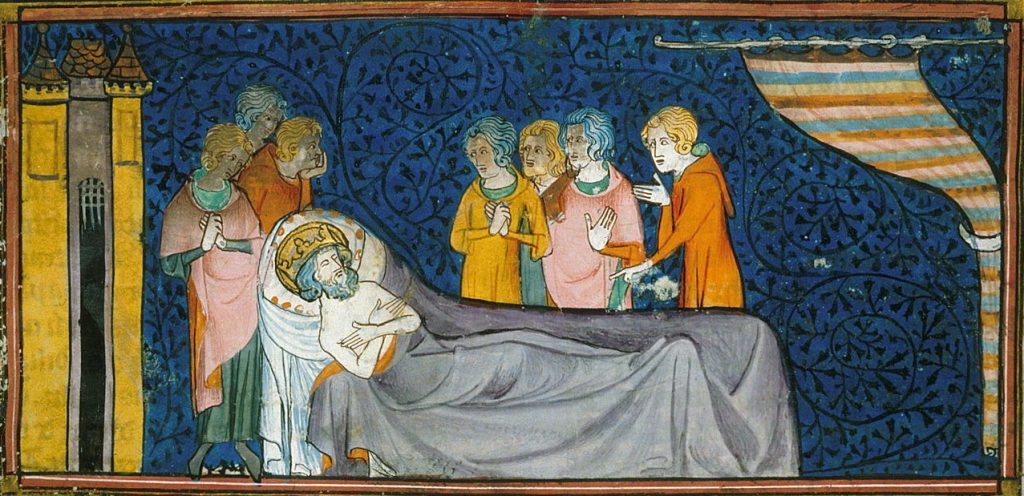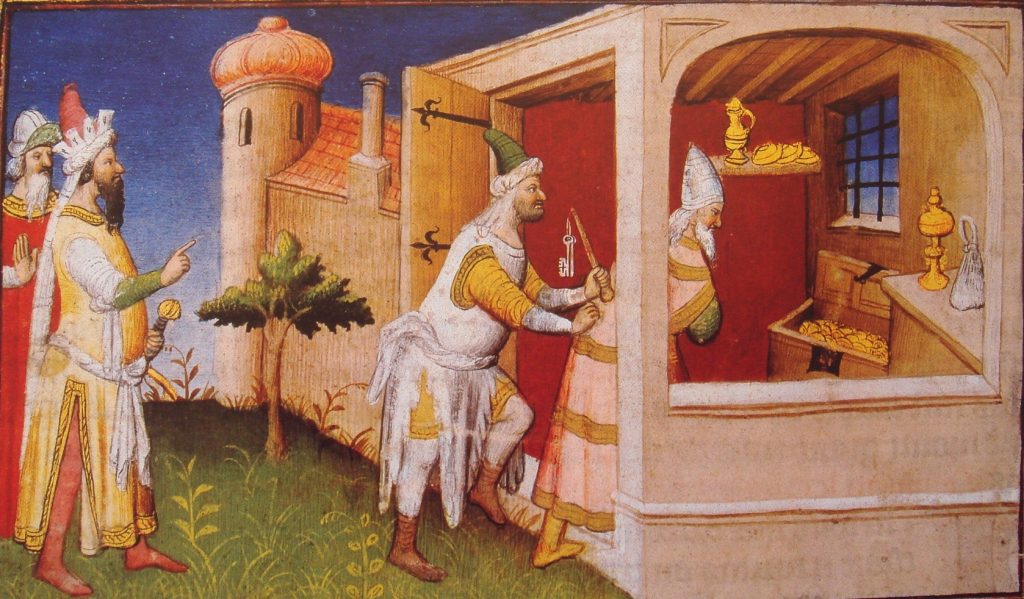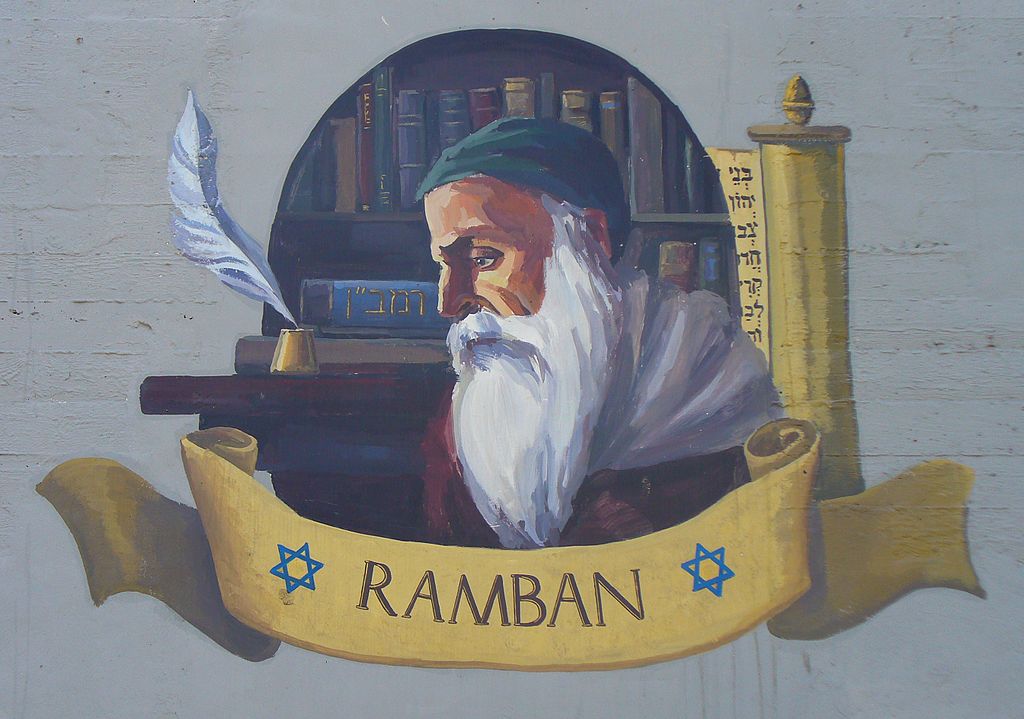
1250 AD to 1270 AD, Psalm 110: Nahmanides.
This site was first built in French (see www.147thgeneration.net). The English translation was mainly done using « google translation ». We have tried to correct the result of this translation to avoid interpretation errors. However, it is likely that there are unsatisfactory translations, do not hesitate to communicate them to us for correction.
(for that click on this paragraph)
Summary
This generation of the 1250s and 1260s.
According to our count, this generation is the 110th generation associated with Psalm 110. It is in this Psalm 110 that we therefore find an illustration of the facts of this generation.
While European Christianity marked its hegemony by launching a first attack against the Talmud in the previous generation, the ideological struggle continues to this generation.
If the Jews of the previous generation had to defend themselves in a country governed by Louis IX, king radically hostile to the Jews, those of this generation must face a new debate in a country where the monarch is – relatively – well oriented towards the Jewish community , this one indeed has place in Barcelona.
The issue of the Barcelona dispute in 1263 is of prime importance for the Jews of Europe: a defeat would have allowed the Church to erase European Judaism.
The one who leads the debates on the Jewish side is Nahmanides (Ramban). The authority of Nahmanides is recognized not only by the Jews but also by the king of Aragon Jaime I, with whom he maintains a privileged relationship. It intervened in 1232, during the controversy which opposed in the Jewish communities of Provence the partisans of Maimonides and his adversaries. To argue with Nahmanides is to argue with the « master » of the Jewish tradition.
Oddly enough, part of the psalm associated with this generation is commented on during the Barcelona dispute.
If the Dominicans fail to achieve their initial goal of converting Jewish communities in Europe, they compensate for this defeat by judicial harassment of the Jews. Indeed new constraints are decreed as a result of the dispute on the part of both royal power and the papacy. Feeling no longer in the odor of sanctity, Nahmanides emigrates to the Holy Land imitating in this, Rabbi Yehiel of Paris who had debated him in Paris to the previous generation, and who, for similar reasons, had also taken the same path.
He settles in Jerusalem that does not have Jewish inhabitants at that time, builds a synagogue in an old abandoned house. This synagogue, the oldest in Jerusalem, bears its name and is still in use (after the Turkish conquest in 1517, it becomes a cheese factory and is used again as a synagogue only from 1967). He exhorts the Jews to return to live in Jerusalem. From this date, there are throughout the centuries, Jews in Jerusalem. Although the final return to Sion is still distant, it is irreversibly initiated to this generation thanks to the determination of Nahmanides.
Talk
New offensive against the Talmud
This generationWhile European Christianity marked its hegemony by launching a first attack against the Talmud in the previous generation, the ideological struggle continues to this generation. is that of the 1250s and 1260s.
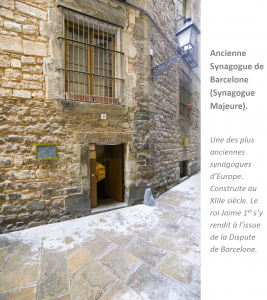
If the Jews of the previous generation had to defend themselves in a country governed by Louis IX, king radically hostile to the Jews, those of this generation must face a new debate in a country where the monarch is – relatively – well oriented towards the Jewish community , this one indeed has place in Barcelona.
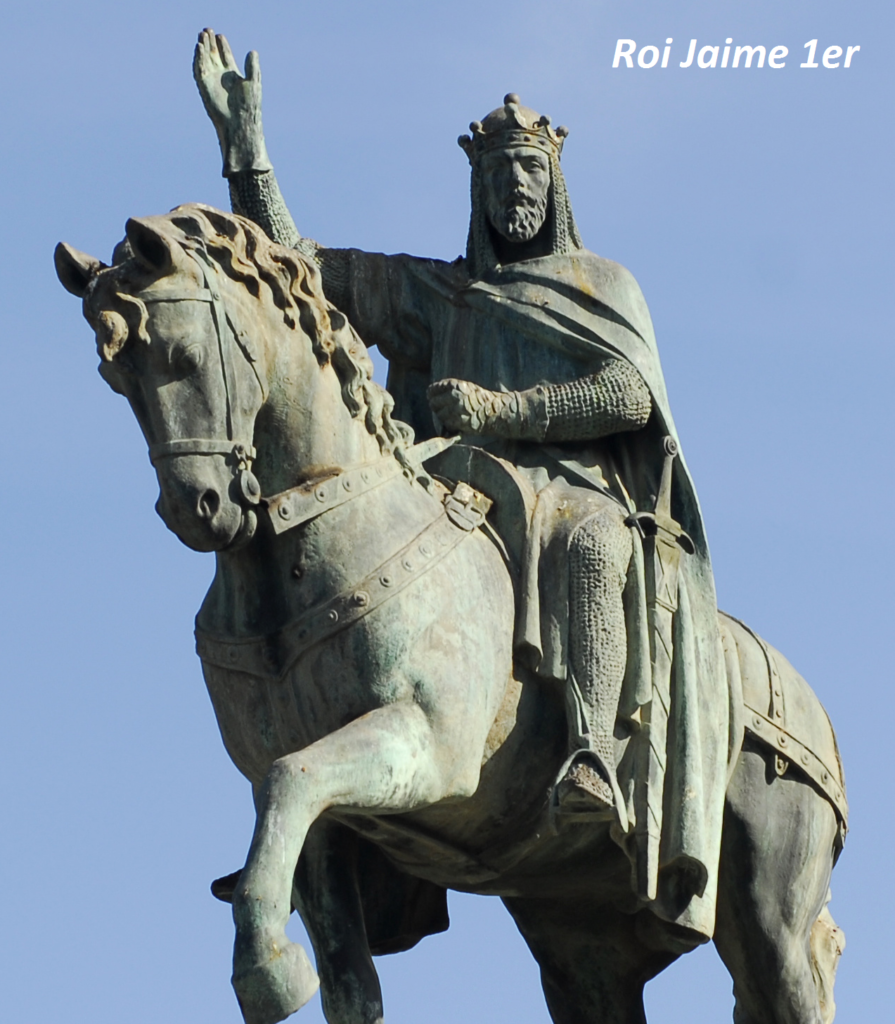
The Christian kings of Spain at that time still need the Jews to carry out the reconquest, when this one will finish, it will be otherwise.
On the death of King Jaime I, who is actively attending the Barcelona dispute, the situation will begin to deteriorate for the Jews of Aragon.
The issue of the Barcelona dispute in 1263 is of prime importance for the Jews of Europe: a defeat would have allowed the Church to erase European Judaism.
Nahmanide
The one who defends Jewish interests is a recognized authority of Spanish Judaism:
- The authority [1] of Nahmanides is recognized not only by the Jews but also by Jaime with whom he has a special relationship. From 1211, his writings made him known and he quickly became a master of the first order in matters of Halakha (jurisdiction); a renowned commentator of the Torah, but also a cabalist, his many activities make him a central figure in the Jewish communities of the Iberian Peninsula. He is probably named chief rabbi of Catalonia in 1264, on the death of Jonas Abraham of Girona. The fame and authority of the Rabbi of Girona go beyond the borders of the crown of Aragon. His intervention in 1232, during the controversy between the supporters of Maimonides and his opponents in the Jewish communities of Provence is ample proof of this. A desire for conciliation emerges from the letters he addresses to the Aljamas of Catalonia, Aragon and Navarre and to the rabbis of northern France. Its ultimate purpose then is to avoid the destruction of the Jewish people and to protect them from external influences. Thus, to argue with Nahmanide is to argue with the « master » of the Jewish tradition. His reputation as a Talmudist identifies him as the protagonist in which the Church has set the goal of appropriating or censoring the Talmud.
This status of « master » is the subject of a real debate during the Barcelona dispute, its opponents try to question this title. Nahmanide is nicknamed the « Master of Girona », a title that his opponents Paul Christiani dispute among others:
- So well [2] that none of you now have the right to be called rabbi (my master). They call you Maestro is a mistake.
This challenge, which Nahmanide reports, is also reflected in the account of the dispute made by the Church:
- As [3] it was made known that he should not be called « master » because since the passion of Christ, a Jew can not be called so, he conceded at least to recognize that it was true for about eight hundred years.
Droste effect
The beginning of this generation’s psalm favors Nahmanides, evoking the « Master » who can take over his enemies:

- Of David a psalm. The word of the Lord to my master; « Wait for My right hand, until I make your enemies a footstool at your feet. »
While the psalmist evokes the dispute of Barcelona and that Nahmanides is the one who leads the debates on the Jewish side, the beginning of the psalm of this generation is strangely evoked in this dispute it evokes! Thus the title of the psalm of this generation as well as the first verse are thus quoted in this dispute when the nature of Jesus is evoked:
- Brother Paul [4] intervened:
- Here is a psalm saying, « Of David a psalm. The word of the Lord to my master: Wait for My right hand ». Who is he whom King David calls « My Master, » if not God? And how could a man sit at the right hand of God?
- Here is a psalm saying, « Of David a psalm. The word of the Lord to my master: Wait for My right hand ». Who is he whom King David calls « My Master, » if not God? And how could a man sit at the right hand of God?

In fact, quite irrationally, the protagonists are commenting on the verses they are creating through their debates. Recall that this process of recursion has been widely used in Psalm 104.
Thus in the debate, the subject that is the subject of the sequel of the psalm is also the subject of debate.
One of the elements of this debate is the question of the Messiah whom Christians identify with Jesus while the Jews are still waiting for his coming; Paul Christiani, a converted Jew who defends the interests of the church, addresses the subject:
- Here is [5] what writing says: « The scepter shall not depart from Judah,(…), until Shiloh comes, and to him will be a gathering of peoples. (quote from Bereishit – Genesis – Chapter 49, verse 10) » and who is the Messiah. This prophecy announces that Judah will always have power and sovereignty, until the Messiah emerges from him. Now, in this case, since you do not have a single tribe or legislator today, recognize that the Messiah, worthy descendants of Judah, has already come and that the kingdom belongs to him « .
- The intention of the prophecy, I replied (it is Nahmanides speaking) is not to pretend that the sovereignty of Judah will never be abolished, but to certify that it will not be passed from Judah to other tribe. His purpose is to affirm that as long as there is a kingship for Israel, it will belong to Judah. And if it happens that the sovereignty of Israel is abolished because of sin, once returned, it will belong to Judah.
Nahmanides and Jerusalem
In fact, this dispute contributes to the realization of this prediction.
If the Dominicans fail to achieve their initial goal of converting Jewish communities in Europe, they compensate for this defeat by judicial harassment of the Jews. Indeed new constraints are decreed as a result of the dispute on the part of both royal power and the papacy.
Feeling no longer in the odor of sanctity, Nahmanides emigrates to the Holy Land imitating in this, Rabbi Yehiel of Paris who had debated him in Paris to the previous generation, and who, for similar reasons, had also taken the same path:
- In 1257 [6], Rabbi Yehiel of Paris settles in Acre and founds there the Ham Hamidrash Hagadol Me Partz, the big house of Studies of Paris,
- In 1267, the most famous emigrant was Rabbi Moshe Ben Nahman, Nahmanides (1194-1270), doctor and Spanish Talmudist.
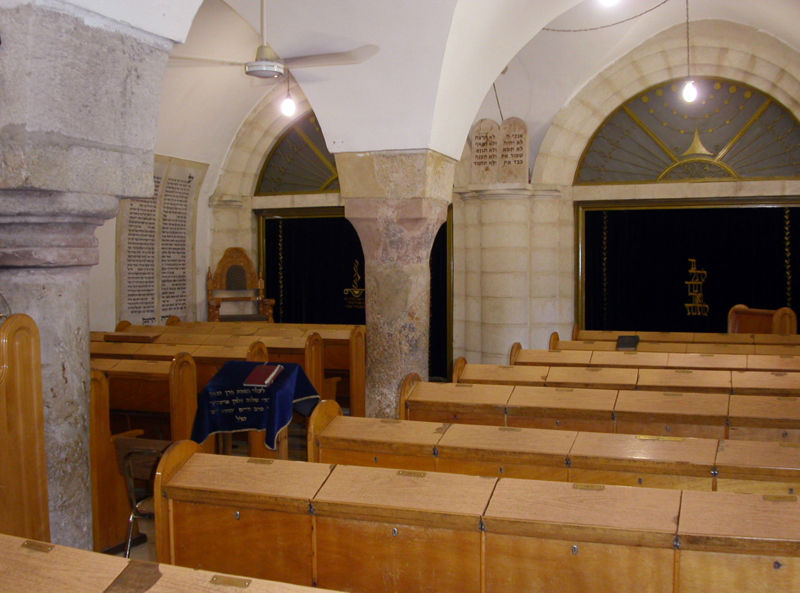
- He settles in Jerusalem that does not have Jewish inhabitants at that time, builds a synagogue in an old abandoned house. This synagogue, the oldest in Jerusalem, bears its name and is still in use (after the Turkish conquest in 1517, it becomes a cheese factory and is used again as a synagogue only from 1967). He exhorts the Jews to return to live in Jerusalem. From this date, there are throughout the centuries, Jews in Jerusalem. He also teaches in Acre where he died in 1270.
- Ramban’s aliyah is an example to his followers and to subsequent generations: indeed, he proclaims that living in Eretz Israel is one of the 613 Mitzvot of the Torah to which the Jewish people are subject.
Thus by causing the dispute in Barcelona and consequently the departure of Nahmanides to Israel, the Church contributes to the fulfillment of the promise made by Jacob to his descendants. Promise repeated in the rest of the psalm of this generation:

- The staff of your might the Lord will send from Zion; rule in the midst of your enemies.
- Your people will volunteer on the day of your host, because of the beauty of holiness when you fell from the womb; for you, your youth is like dew.
Although the final return to Sion is still distant, it is irreversibly initiated to this generation thanks to the determination of Nahmanides who deserves the qualifier of « Master » until the night ends and the dawn of the Jewish people end up enlightening the world.
In a letter to his son, Nahmanides mentions his Aliyah in 1267:
- It[7] is in Jerusalem, the Holy City, that I am writing this letter to you. For- thanks and praise be to the Rock, my Savior- , I had the privilege of reaching Jerusalem in peace on the 9th day of the month of Elul and of stopping there. Until the day after Yom Kippur, when I intended to go to Hebron, the city of the graves of our Fathers, in order to bow down before them, and to choose a grave for myself, with God’s help,
- What will I tell you about the land, if not that it is abandoned and deserted beyond anything one can imagine: Paradoxically, the ruin is inversely proportional to the Holiness: Jerusalem is in ruins more than everything else ; and the land of Judah more than Galilee.
- And yet, in spite of all its ruins, this Earth is marvelously good, Jerusalem counts 2000 inhabitants, including 300 Christians, escaped from the sword of the Sultan. No Jew lives there. Because, when the Tartars arrived, the Jews fled, others were slaughtered with swords. Only two dyer brothers remained, who bought their dyes from the governor. Around them gather just the right number of men to constitute the Minyan of the Shabbat prayers which are performed at their homes.
- We encouraged them to be more zealous, and found, indeed, an abandoned house, built of marble columns with a beautiful dome, and we are using it as a synagogue. Because the city is entirely handed over to the public domain and everyone is free to appropriate abandoned buildings.
- We have the wish to restore this synagogue and, already, we have taken a first step, going to pick up Torah scrolls from Shechem. Which had previously been in Jerusalem and had been buried there when the Tartars arrived.
- Now the synagogue is standing and we say our prayers there. There are many Jews who come to Jerusalem continuously, men and women from Damascus, Zova, all the provinces of Erets, to see the Holy Temple and weep over it.
- May He who allowed us to see Jerusalem in its ruin allow us to see it in its reconstruction and restoration, when the glory of the Shehinah returns there.
- And may you, my son, as well as your brothers and all your family, have the privilege of tasting the beauty of Jerusalem and the Consolation of Zion.
Hebron
At the beginning of his letter, Nahmanides recalls his visit to the tombs in Hebron and his love for the ruins of the Holy Land. Behind the simple devotion, there is the will to remind that this land is the land of the Jews:
- Carmoly[8] (in 1847), in his preface to the first edition of The Palestine Route, wrote: “This love for the ruins and demolished stones of the Holy Land has continued in Israel. From the depths of Asia, the deserts of Africa, all parts of Europe, every century, since the destruction of the Temples, has seen the sons of Zion flock there in droves. During the Christian domination, the enthusiasm which drew them towards this beloved land was so great that there were no evils, no outrages which they did not endure for the supreme happiness of wandering on the sacred hills of Jerusalem, to embrace its ruins, to water its ashes with their tears ”.
- Thus driven from the land of their ancestors, driven from other countries, what should the Jews do if not show their attachment to their lost homeland, relentlessly reiterate their rights to the land which was torn from them by violence? The Jews knew full well that a day would come when the nations would challenge their legitimacy on this land. It was to prevent such a situation that they demanded at all times, without the slightest interruption, their legitimacy and their rights, by going to the land of their ancestors, often at the risk of their lives. Those heading for Jerusalem and other cities in Israel had a specific goal: to remind the occupiers that the land was not theirs.
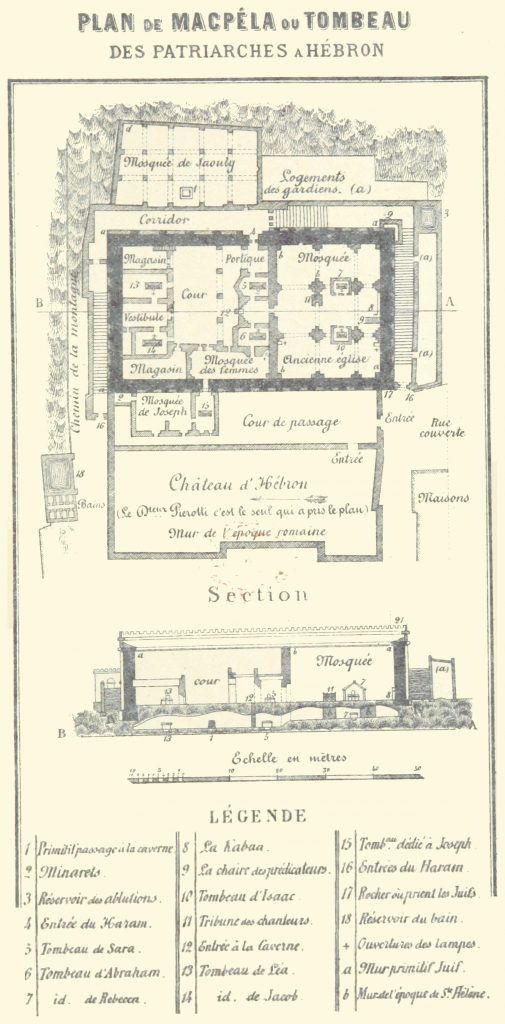
- Pilgrims braved multiple obstacles, and often death, to bow down on gravestones. […]
- The graves symbolize the roots and attachment of the Jews to the land of Israel. The fact of centering the pilgrimage around the tombs of the patriarchs and the doctors of the law, is very significant. It is a way of making testify those who were in possession of the title deeds, of affirming that these tombs constitute the most obvious proof that this land is indeed Jewish. […]
- Around 1258, one of the members of the rabbinate of Paris, Rabbi Jacob, went to the countries of the East to collect money for the benefit of Rabbi Yehiel’s school in Paris. He continued his journey to the Holy Land, and brought back a list of eighty tombs he would have visited during his stay.
In Hebron, there is obviously the tomb of Abraham to whom God had promised the land of Israel to his descendants[9]. After this promise, he went to free his nephew Lot and made a pact with the victors with whom he had joined:
- And[10] Abram heard that his kinsman had been taken captive, and he armed his trained men, those born in his house, three hundred and eighteen, and he pursued [them] until Dan.
- And he divided himself against them at night, he and his servants, and smote them, and pursued them until Hobah, which is to the left of Damascus.
- And he restored all the possessions, and also Lot his brother and his possessions he restored, and also the women and the people.
- And the king of Sodom came out toward him, after his return from smiting Chedorlaomer and the kings who were with him, to the valley of Shaveh, which is the valley of the king.
- And Malchizedek the king of Salem brought out bread and wine, and he was a priest to the Most High God.
- And he blessed him, and he said, « Blessed be Abram to the Most High God, Who possesses heaven and earth.
- And blessed be the Most High God, Who has delivered your adversaries into your hand, » and he gave him a tithe from all.
Shechem
The willingness of Nahmanides, like his predecessors, to assert through these pilgrimages eternal ownership of the land of Israel to the Jews, despite apparent foreign domination, is evident. But by going to get the scrolls of the law from Shechem, Nahmanides goes even further.
Shechem, referred to here, is a city of significant importance in Jewish history. It is in particular the first city where Abram stops when he arrives in the land of Canaan to carry out the divine order to leave his native land towards the land which God desires to give to his descendants:
- And[11] Abram took Sarai his wife and Lot his brother’s son, and all their possessions that they had acquired, and the souls they had acquired in Haran, and they went to go to the land of Canaan, and they came to the land of Canaan.
- And Abram passed through the land, until the place of Shechem, until the plain of Moreh, and the Canaanites were then in the land.
- And the Lord appeared to Abram, and He said, « To your seed I will give this land, » and there he built an altar to the Lord, Who had appeared to him.
- And he moved from there to the mountain, east of Beth el, and he pitched his tent; Beth el was to the west and Ai was to the east, and there he built an altar to the Lord, and he called in the name of the Lord.
If Abram stops at Shechem to erect an altar there to the honor of God, Jacob, before leaving for Bethel, buries the idols which still remain in his camp there. Previously, Dinah had been raped by Shechem (the character), and, Jacob’s sons had avenged themselves by exterminating his tribe (revenge condemned by Jacob):
- And[12] God said to Jacob, « Arise and go up to Beth el and abide there, and make there an altar to the God Who appeared to you when you fled from your brother Esau. »
- Thereupon Jacob said to his household and to all those who were with him, « Remove the deities of the foreign nations, which are in your midst, purify yourselves and change your clothes.
- And we will arise and go up to Beth el, and I will make an altar to the God Who answered me on the day of my distress, and was with me on the way that I went. »
- And they gave Jacob all the deities of the nations that were in their possession and the earrings that were in their ears, and Jacob hid them under the terebinth that was near Shechem.
- Then they traveled, and the fear of God was upon the cities that were around them, so that they did not pursue Jacob’s sons.
Thus Shechem inherits from the patriarchs the best and the worst: an altar in honor of God raised by Abraham (who was then still called Abram) and idols deposited by Jacob. It is therefore no accident that it is from this place that God leaves the choice to the Jewish people, before their entry into Israel, between blessings and curses.
Shechem is indeed a city in the mountain of Ephraim, at the entrance of the gorge that separates Mount Ebal and Mount Gerizim[13]. It is these two mountains that materialize the choice left to the people of Israel:
- Behold[14], I set before you today a blessing and a curse.
- The blessing, that you will heed the commandments of the Lord your God, which I command you today;
- and the curse, if you will not heed the commandments of the Lord your God, but turn away from the way I command you this day, to follow other gods, which you did not know.
- And it will be, when the Lord, your God, will bring you to the land to which you come, to possess it, that you shall place those blessing upon Mount Gerizim, and those cursing upon Mount Ebal.
- Are they not on the other side of the Jordan, way beyond, in the direction of the sunset, in the land of the Canaanites, who dwell in the plain, opposite Gilgal, near the plains of Moreh?
The choice offered to the Israelites is either to behave like Abram when he builds his altar to the « God who appeared to him », therefore to the God he knows. Or to follow foreign gods, such as the idols buried by Jacob in this place. It was the errors between these two choices that were fatal to the Israelites once they settled in the Promised Land.
This blessing / curse duality materialized by this city is recalled by Joshua when he begins to conquer the land of Israel:
- Then[15] Joshua built an altar to the Lord God of Israel on Mount Ebal.
- As Moses, the servant of the Lord, commanded the children of Israel, as it is written in the book of the law of Moses, an altar of whole stones, upon which no (man) has lifted up any iron. And they offered upon it burnt-offerings to the Lord and sacrificed peace-offerings.
- And he wrote there upon the stones a copy of the law of Moses, which he wrote in the presence of the children of Israel.
- And all Israel, and their elders and officers and their judges, stood on this side of the Ark and on that side, before the priests the Levites, the bearers of the Ark of the covenant of the Lord, the stranger as well as the native born, half of them over against Mount Gerizim and half of them over against Mount Ebal, as Moses the servant of the Lord had commanded, to bless the people of Israel first.
- And afterward he read all the words of the law, the blessing and the curse, according to all that is written in the book of the Torah.
If the dichotomy of Shechem is confirmed by Joshua, the Torah takes pride of place here because, like the altar erected by Abram, it represents the voice of good, of blessings, to the people of Israel. Shechem has an important place on other occasions when the Jewish people have to struggle between their orientations towards good or evil. This is in particular the place where Jacob sends Joseph to face the jealousy of his brothers:
- And[16] his brothers went to pasture their father’s flocks in Shechem.
- And Israel said to Joseph, « Are your brothers not pasturing in Shechem? Come, and I will send you to them. » And he said to him, « Here I am. »
When Joseph says « I am ready », he is in fact speaking for the whole of the people of Israel, because following this departure, it is indeed the exile of the people of Israel in Egypt that is initiated. It was also in Shechem that Abimelech was proclaimed king and died there after having punished the inhabitants of the city[17]. It was also thanks to the women of Shechem that the tribe of Benjamin escaped extermination[18]. It was to Shechem that Rehoboam, son of Solomon, went in the hope of being proclaimed king[19] and thus the schism between Judah and Israel was initiated. Jeroboam returned to Shechem, occupied and fortified it, and was proclaimed there king of Israel. He then initiated an idolatrous cult (golden calves) to compete with divine worship in Jerusalem under the control of the kingdom of Judah.
Thus, the city of Shechem represents the choice between curses and blessings that God offers to the Jews when He offers them the land of Israel. When the Jews first entered the land of Israel, they quickly drifted and their oscillation was towards idolatrous worship, assimilated to the idols buried at Shechem by Jacob.
They thus confirmed the choice of the curses which ended in the exile of the Jewish people from the land of Israel which is still not completed in the time of Nahmanides nor in our time elsewhere. But Nahmanides initiates the return to Zion and can be considered the first Zionist in history. In fact not only did he return to the land of Israel but he re-established holy worship by creating a synagogue there and introducing the scrolls of the law there.
These scrolls of the law were preserved in Shechem, presumably buried, because Shechem was at that time a walled city in order to resist the Tartar hordes (the Mongols), symbolizing paganism. Sichem did not in fact resist these, nor did she resist Abimelech’s assault. But in unearthing these scrolls of the law, Nahmanides, unlike his predecessors, clearly chooses divine worship as defined by Abram by building an altar there. This altar being symbolically replaced by Joshua by the Doctrine of God (the Torah) and therefore materialized by these scrolls that Nahmanides unearths.
By his action, Nahmanides confirms the eternal role of the Jewish people as Nation of priests of the Eternal as had preceded him Melchizedek in Salem, which presumably indicates Jerusalem which Nahmanides reinvested.
Thus is illustrated the continuation of the psalm of this generation:

- The Lord swore and will not repent; you are a priest forever because of the speech of Malchizedek.
The defeat of « Saint Louis »
At the same time as Nahmanides initiates the return to Zion and the final reappropriation of Jerusalem to the Jewish people, Christians make a final attempt to appropriate Jerusalem and the Holy Land:
- When[20] Sultan Baybars resumed the offensive in 1265 and captured Caesarea, Safed and the citadel of Beaufort, a real civil war was between the various Christian populations. King Louis IX took up the cross and sailed in 1270 for Tunisia, from where he intended to return to Egypt. Barely a week after disembarking near Carthage, it was swept away by the plague. Thus ended the eighth and last of the Great Crusades.
Louis IX, nicknamed « Saint Louis » is the king who turned the policy towards the Jews into a resolutely hostile policy and which thus provoked the first « aliyah » (that of Rabbi Yehiel following the dispute in Paris, then that of Nahmanides following the dispute over Barcelona which is only the consequence of the previous one). It is this king who will be, by his failures in his crusades, seal the end of Christian domination in the land of Israel and thus leave the way clear for the gradual return of the Jews to their land.
He does not die in a fight but of disease thus showing the divine role in this failure. This is illustrated by the rest of the psalm of this generation:

- The Lord, on your right hand, has crushed kings on the day of His wrath.
The death of Louis IX, a symbol of radical Christian anti-Semitism, must be interpreted as the result of divine intervention, as the preceding excerpt from the psalm of this generation suggests:
- In[21] the spring of 1270, disturbing news reached Baybars (we will discuss this character later): the King of France Louis IX, the same whom he had fought in Damietta and Mansourah, united a large fleet and a powerful army. What would be his destination? Everything pointed to Egypt, and Baybars, who was then in Syria, immediately returned to Cairo. The defenses of the Egyptian ports were reinforced and the walls of Ascalon that Saint Louis had used on his previous expedition were completely destroyed. In fact in 1248, the Mamluks were formidable on land but completely powerless at sea and could not prevent a fleet from gaining a foothold on a coast. Hence the removal of any stronghold on it that could serve as an anchor for the Crusaders. These precautions were unnecessary: leaving France on July 2, 1270 with ten thousand or fifteen thousand men, the squadron quickly dispersed by the heavy weather managed to assemble in Cagliari, and there, to everyone’s astonishment, the king revealed the destination of the expedition: Tunis. We would then head to Egypt. […]
- He fervently wished the conversion to Christianity of King Hafside of Tunis, Emir Mohammed, whose zeal for Christians was praised. […]
- The end is too well known to be described: the landing in July in terrible heat, the epidemic – dysentery or cholera – of which the French were victims, the death of the king on August 25. And Muhammad the Hafsid remained a good Muslim. Charles of Anjou, who arrived on the very day of his brother Louis IX’s death, negotiated an agreement with Mohammed that was advantageous for himself, which allowed him to retire with a large indemnity, taking with him the fleet and the army. His goal was to attack Byzantium and eliminate Michael Palaeologus for his benefit. Fate (!) was also against him: a big storm dispersed a large part of the fleet in front of Trapani: forty boats, eighteen of which were large ones. The last crusade led by a king of France ended in disaster. The era of great Christian expeditions to the Holy Land was over.
Thus the Crusaders who had shed so much Jewish blood in their expeditions to appropriate the Holy Land will during this generation be definitively repelled from it. The last strongholds like Saint John of Acre will fall at the start of the next generation. This definitive ebb was initiated by the end of the last crusade when the Crusaders, Louis IX at the head, were punished by water (storms) and air (epidemic). Elements that God reserves to punish those who rise up against his people thus justifying the continuation of the psalm of this generation:

- He will execute justice upon the nations (…)
Mamluks.
This justice, for this generation, is instrumentalised by a new power made up of slaves. To allow the Jews to resettle in the land of Israel, without being subject to the moods of Christian power, a new power emerges at the beginning of this generation: the Mamluks, more particularly the Mamluks of Egypt.
During his previous attempt at a crusade in 1248, Louis IX had tried to gain a foothold in Egypt in order to continue towards Palestine. The Christian forces in the Holy Land then had to face a perilous situation:
- Never[22] had the Frankish countries of the Levant been in such danger. The fragile balance that had managed to be established between the masters of the Hospital, the Templars, and Sultan al-Salih Ayyoub (Ayyubid sultan of Egypt from 1240 to 1249) was almost immediately questioned by the maliks ( governors) of Damascus, Aleppo and Homs. Jerusalem, which had been recovered almost miraculously through the benevolence of Salih Ismail (al-Salih’s uncle), had been taken and sacked by the Kwarezmians, Turks fleeing westward from the Mongol invasion. And above all, on October 17, 1244, between Ascalon and Gaza, in a place that the European historians of the time call La Forbie, Kwarezmiens allied to Egyptian units with, at their head, a young officer, Roukn Al-Dîn Baybars had inflicted to the Franks allied to the troops of the Malik of Damascus a terrible defeat: 312 Templars killed out of a total of 348, 325 of the 351 Hospitallers, 3 Teutonic Knights who survived out of 400. According to the Patriarch of Jerusalem, 16,000 francs and their allies had been killed. The Frankish army in Syria was reduced to a few hundred men. The Grand Master of the Hospital prisoner, all the Knights of Cyprus killed, the disaster was total and irreparable.
When Saint Louis landed in Damietta in 1248, he refused the proposal of Sultan al-Salih Ayyoub to restore Jerusalem to him in exchange for Damietta, thinking he could defeat the latter with the reinforcements expected from his brother Alphonse de Poitiers.
Baybars
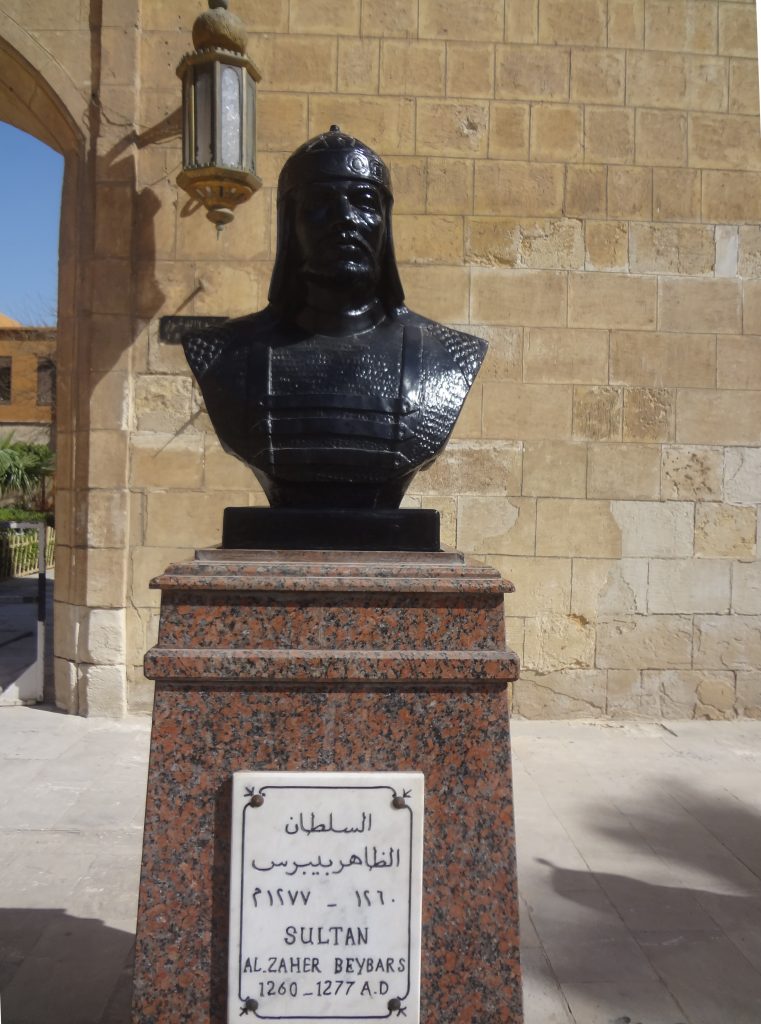
But in the meantime the sultan died in 1249, despite the succession of the latter not very well assured, the Franks, exhausted by the Plague, were beaten by Baybars. Egypt had for a long time based its power on the Turkish slaves bought abroad (in particular from the steppes of Russia) of which Baybar belonged (which due to a defect in the eye had not been bought from very great price).
Louis IX taken prisoner will be released after payment of a ransom. Famous for this victory, the Mameluks seized power ten years later: in 1259 the Mameluke Koutouz was appointed sultan, assisted by Baybars his Emir. They thus founded the Mameluke empire, of which the forty-five successive sultans, will rule Egypt and Syria until 1517. Empire not founded on filiation, because each sovereign must have been a slave first. From his accession, he had to face the Mongol threat:
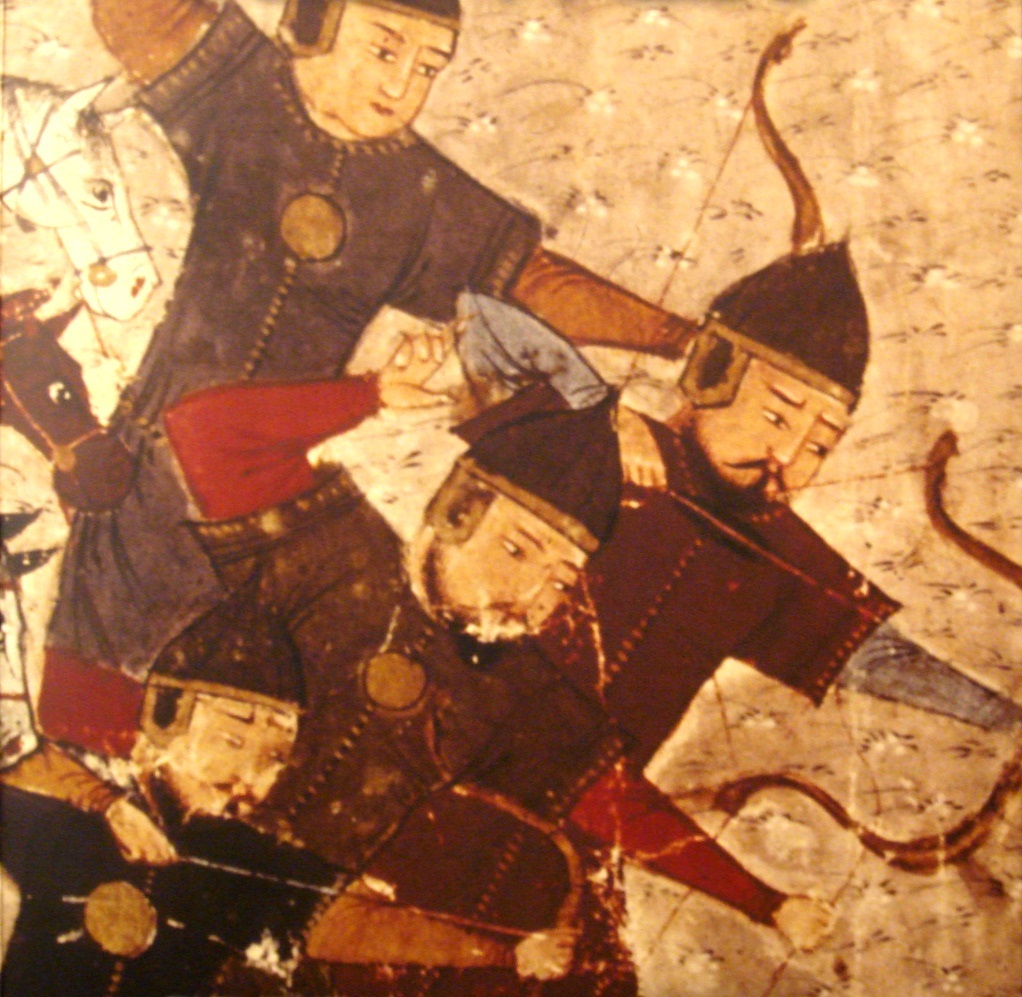
- In 1237[23], on the Volga, an army of more than one hundred thousand men had crushed the Bulgarian tribes established there, then darkened on Moscow which fell in 1238. In turn, Rostov, Tver, Yaroslav were taken, the tribes of Polovts made their submission. The capture and destruction of Kiev astonished and grieved the whole of Christendom. The turn of Hungary and Poland came soon after. On March 24, 1241, Krakow fell, the German and Polish knights routed. A few months later, the troops of King Béla IV of Hungary suffered a terrible defeat. Over sixty thousand men perished.
- – (After a respite due to the succession of the great Khan Ogoday, the Mongols continued their conquests in the Middle East. With Iran submissive, the Mongols turned to Baghdad in 1256)
- – The Mongol (Hülegü) then attacks the caliph of Baghdad, « the power of God on earth », the highest spiritual authority in Islam, the direct descendant of Muhammad. […]
- Soldiers and inhabitants of Baghdad were massacred. Ninety thousand people are said to have perished. On February 10, Moustasim, the Caliph of Baghdad, himself came to surrender. Three days later, the city was on fire, the tombs of the Caliphs were destroyed, the Caliph was forced to hand over his treasures under threat, and then he was killed.
- Out of respect for his person, he was killed by suffocating him under rugs. The city that had shone for centuries with unparalleled brilliance will never regain its role as the religious and political capital of Islam. […]
- It was a terrible disaster, a loss that nothing would ever replace. All of Dar-al Islam was in the hands of the infidels except Egypt and North Africa. The Muslim world was terrified.
- (helped by the King of Armenia the Mongols are heading towards the Holy Land to deliver Jerusalem from the Muslims)
- Hülegü’s army left Azerbaijan in the fall of 1259. Successively Nisibin, Haran, Edessa fell and the siege of Aleppo began. Six days later, the city was taken. The massacre lasted a week. Héthoum (Christian king of Armenia) himself set fire to the great mosque. Christians celebrated their « deliverance » with rejoicing and vexations inflicted on Muslims – pork in mosques, for example – which should not be forgotten. Nablus fell, then Gaza. All of Syria was in the hands of the Mongols. The road to Egypt was open to Hülegü, who would continue his conquests in North Africa from there. The Muslim world saw the looming storm coming with terror. Europe, in its horror of Islam, preferred to try to negotiate with the barbarian rather than try to fight him. Salvation, for both, came from where it was not expected. […]
- Baybars persuaded his people to refuse to surrender, the heads of the Mongol ambassadors who had come to ask for submission were cut off, and the army prepared for battle.
- The meeting took place on September 3, 1260 – an important date for history – in Aïn Djâlout, not far from Nablus (and not far from Shechem …), in Palestine.
- (the battle turned to the disadvantage of the Mongols who suffered their first defeat and retreated)
- Islam was saved and, probably, Europe with it. The Mongols had not been put out of action and driven out of the Middle East. Other battles brought them to grips with the Muslims, but it was Aïn Djâlout the decisive fight, the one that marked the end of the westward march of the descendants of Genghis Khan.
After this victory[24], Baybars gets rid of Sultan Koutouz to take his place and, after eliminating any potential opposition, he is ready to fight the last Christian forces present in the Middle East:
- At the end of 1262, Baybars began the war he never ceased to think about and which should drive Christians out of Muslim lands forever.
- The first objective of the Sultan is to seize Acre (which will fall later, he takes Caesarea, Haifa and Atlith)
- (Then it’s the turn of) Arsouf, in the hands of the Hospitallers. The siege lasted forty days with the use of mines and machinery to defeat the defenders. Baybars fought himself with gun in hand. Ninety Hospitallers are killed, the victims number twenty thousand.
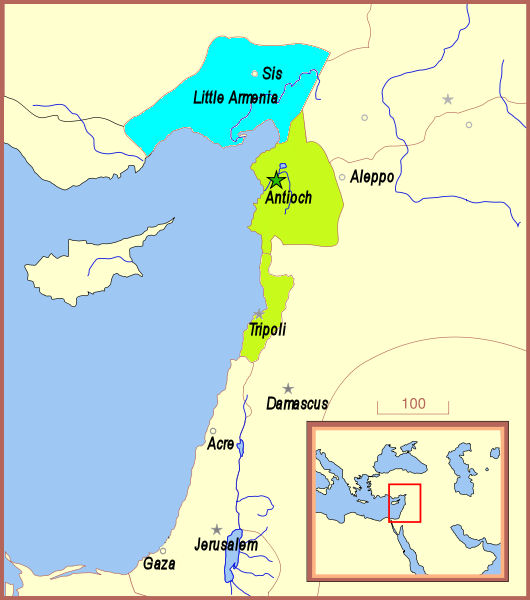
In 1266, he obtained the surrender of Safed held by the Templars, he then attacked Armenia which had allied against him with the Mongols:
- The Armenians were crushed. […], Thousands of men killed – forty thousand, it is said – or taken captive, the disaster was complete.
In 1268 Baybars began his third campaign, capturing Jaffa. His next target is Antioch, which had allied with the Armenians and the Mongols:
- The Crusaders surrendered on a promise to be saved; all were massacred at the same time as the whole population of the city […]. According to Ibn al-Zahir, the historian of Baybars, the number of killed was over forty thousand.
After the abortive Saint Louis crusade in 1270, Baybars continued his attacks against the Crusaders.
Thus between the Mongol conquest and that of the Mamluks, the victims were numerous. However, these events made it possible to achieve a balance between the Christian and Muslim powers which will eventually allow the Jews to return to their land; even though they themselves will be among the many victims of generations to come. This is the conclusion of the psalm of this generation:

- (He will execute justice upon the nations) [into] a heap of corpses; He crushed the head on a great land.
- From the stream on the way he would drink; therefore, he raised his head.

[1] (translated into French from Hebrew and Latin by) Eric Smilevich and Luc Ferrier: « The Barcelona dispute ». Introduction. (French: « La dispute de Barcelone ». Introduction (p. 13-14) )
[2] (translated into French from Hebrew and Latin by) Eric Smilevich and Luc Ferrier: « The Barcelona dispute ». » First day « . (French: « La dispute de Barcelone ». « Premier jour » (p. 37) ).
[3] (translated into French from Hebrew and Latin by) Eric Smilevich and Luc Ferrier: « The Barcelona dispute ». « Minutes ». (French: « La dispute de Barcelone ». « Procès-verbal» (p. 104) ).
[4] (translated into French from Hebrew and Latin by) Eric Smilevich and Luc Ferrier: « The Barcelona dispute ». « Fourth day « . (French: « La dispute de Barcelone ». « Quatrième jour » (p. 35) ).
[5] (translated into French from Hebrew and Latin by) Eric Smilevich and Luc Ferrier: « The Barcelona dispute ». » First day « . (French: « La dispute de Barcelone ». « Premier jour » (p. 35) ).
[6] Marianne Picard: « Jews and Judaism, from 70 to 1492 – Volume 2 ». (French: « Juifs et Judaïsme, de 70 à 1492 – Tome 2 ». (p. 204-205) ).
[7] Marianne Picard: « Jews and Judaism, from 70 to 1492 (french reference : Marianne Picard : « Juifs et Judaïsme, de 70 à 1492 – Tome 2 ». (p. 210) ).
[8] Haïm Harboun: « The Jewish travelers of the 13th, 14th and 15th centuries ». (french reference : Haïm Harboun : « Les voyageurs juifs des XIIIe, XIVe et XVe siècles ». (p. 23 à 25) )
[9] Bereishit – Genesis – Chapter 12
[10] Bereishit – Genesis – Chapter 14, verses 14 to 20
[11] Bereishit – Genesis – Chapter 12, verses 5 to 8
[12] Bereishit – Genesis – Chapter 35, verses 1 to 5
[13] Identification of this place as Shechem from « Dictionary of Proper Names of the Bible » (french reference : « Dictionnaire des noms propres de la Bible » (p. 356) )
[14] Devarim – Deuteronomy – Chapter 11, verses 26 to 30
[15] Yehoshua – Joshua – Chapter 8, verses 30 to 34
[16] Bereishit – Genesis – Chapter 37, verses 12 and 13
[17] Shoftim – Judges – Chapter 9
[18] Shoftim – Judges – Chapter 21
[19] Melachim I – I Kings – Chapter 12
[20] Simon Schwarzfuchs: « The Jews in the Time of the Crusades ». Chapter: « The Last Crusades ». (french reference : Simon Schwarzfuchs : « Les Juifs au temps des croisades ». Chapitre : « Les dernières croisades ». (p. 156) )
[21] André Clot: « The Egypt of the Mamelukes, 1250-1517, the Empire of the Slaves ». Chapter: « The war of liberation ». (french reference : André Clot : « L’Egypte des Mamelouks, 1250-1517, l’Empire des esclaves ». Chapitre : « La guerre de libération ». (p. 90 à 92) )
[22] André Clot: « The Egypt of the Mamelukes, 1250-1517, the Empire of the Slaves ». Chapter: “From Saint Louis to the Mongols”. (french reference : André Clot : « L’Egypte des Mamelouks, 1250-1517, l’Empire des esclaves ». Chapitre : « De Saint Louis aux Mongols ». (p. 21,22) )
[23] André Clot: « The Egypt of the Mamelukes, 1250-1517, the Empire of the Slaves ». Chapter: “ A new plague of God ”. (french reference : André Clot : « L’Egypte des Mamelouks, 1250-1517, l’Empire des esclaves ». Chapitre : « Un nouveau fléau de Dieu ». (p. 29 to 37) )
[24] André Clot: « The Egypt of the Mamelukes, 1250-1517, the Empire of the Slaves ». Chapter: “ The liberation war ”. (french reference : André Clot : « L’Egypte des Mamelouks, 1250-1517, l’Empire des esclaves ». Chapitre : « La guerre de libération». (p. 83 à 101))

